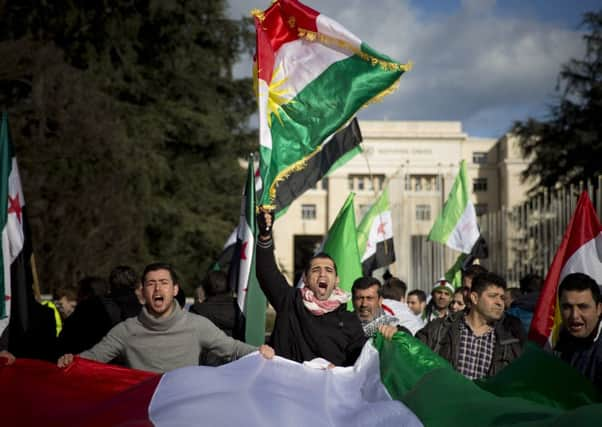Syria: Warring sides to meet in Geneva today


United Nations mediator Lakhdar Brahimi has met the two groups separately over the past two days, trying to broker peace – or at least a measure of common ground – in a civil war that has left at least 130,000 people dead.
“We are going to meet tomorrow. I hope that it will be a good beginning, and that we will continue until the end of next week,” he said last night.
Advertisement
Hide AdAdvertisement
Hide AdMr Brahimi’s announcement came after Syria’s government vowed to leave Switzerland if “serious talks” did not begin by today. The opposition, which agreed to the peace talks only under intense diplomatic pressure, had been reluctant to sit face-to-face with a government it insists must yield power. Direct talks planned for yesterday between the Damascus government and the Syrian National Coalition were scrapped.
The Geneva peace conference aims to stem the violence that has forced millions to flee, destabilised the region and turned Syria into a destination of choice for al-Qaeda-inspired militants.
Direct negotiations are seen by many diplomats as the best hope for an eventual end to Syria’s three-year civil war. Until now, both sides had spent their time in Switzerland affirming positions hardened after nearly three years of fighting, calling each other terrorists and blaming each other for driving their once-thriving country into ruin.
As the peace talks wobbled, fighting raged yesterday in parts of Syria, including near Damascus. Government forces bombed rebel-held areas in the northern city of Aleppo, according to the UK-based Syrian Observatory for Human Rights, and local activists.
Protesters in several Syrian towns demonstrated against the Geneva peace talks, saying Mr Assad had shown with years of military strikes against his people that he favoured violence over negotiations.
“The Assad regime doesn’t understand the language of dialogue. We will remove this criminal regime by force,” read one sign in the town of Sabqa.
Demonstrators in the northern town of Darayan held up another English-language sign, this one reading “Time is blood” – an indication that some felt Mr Assad may be playing for time with the peace talks.
But the two sides’ willingness to meet Mr Brahimi – even separately – has given some hope that negotiations might bear fruit. Mr Brahimi himself has said both sides may bend on humanitarian corridors, prisoner exchanges and local ceasefires.
Advertisement
Hide AdAdvertisement
Hide AdThe Syrian National Coalition, which is made up largely of exiles, lacks influence with an increasingly radicalised rebellion, which has been pulled apart by an influx of foreign militants. Infighting among rebels has left 1,400 people dead in the past 20 days, according to activists.
Iran’s foreign minister yesterday called for foreign fighters to leave Syria, so that its people can decide their future themselves.
Speaking on a panel discussion about the Middle East at the World Economic Forum in Davos, Mohammad Javad Zarif said Iran also wanted to see an end to foreign support for opponents of Mr Assad’s government and recognition by all sides that there can be no military solution to the conflict. He said Tehran hoped for a negotiated settlement.
His call for foreign forces to withdraw from Syria was endorsed by fellow panellists Jordanian foreign minister Nasser Sami Judeh and Turkish foreign minister Ahmet Davutoglu.